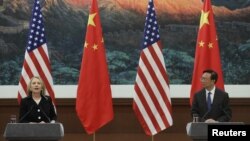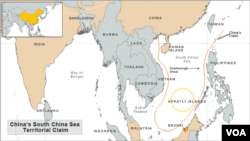BEIJING —
China says there is no questioning its sovereignty over waters and islands in the South China Sea, some of which are claimed by Vietnam, Malaysia, Brunei, Taiwan, and the Philippines. But Chinese officials told visiting Secretary of State Hillary Clinton that they are willing to work with Southeast Asian nations to resolve the dispute peacefully.
Secretary Clinton discussed the South China Sea disputes with Chinese President Hu Jintao and Foreign Minister Yang Jeichi Wednesday.
China has been critical of outside involvement in the dispute, saying foreign governments are trying to divide the region. Speaking to reporters following their talks, Yang repeated China's insistence that this be resolved by the claimants themselves and made clear that China's position is unassailable.
The foreign minister says there is plentiful historic and legal evidence for China's sovereignty over the islands in the South China Sea and adjacent waters. As for disputes to those claims, he says these should be discussed by those directly concerned on the basis of respect for historic facts and international law, to be settled through "direct negotiation and friendly consultation."
Yang says that the stance is in keeping with a 10-year old "declaration of conduct" between China and the Association of Southeast Asian Nations, or ASEAN.
But the United States believes a more specific "code of conduct" is the way to resolve competing territorial claims on which Secretary Clinton again insisted the Obama administration has no position.
"Our interest is in the maintenance of peace and stability, respect for international law, freedom of navigation, and unimpeded lawful commerce. And as a friend to the countries involved, we do believe it is in everyone's interest that China and ASEAN engage in a diplomatic process toward the shared goal of a code of conduct."
Foreign Minister Yang told Secretary Clinton in July that China will "eventually" agree to open talks with ASEAN members over such a code of conduct. He repeated that promise in Beijing.
Yang says nowhere do Chinese and U.S. interests converge more closely than in the Asia-Pacific. At a moment when the international situation is undergoing what he calls "profound and complex changes" and prospects for a global economic recovery "are still quite grim," Yang says Beijing hopes to have a positive and pragmatic relationship with Washington.
U.S. involvement in resolving the South China Sea dispute is complicated by Chinese wariness of the Obama administration's greater military and economic involvement in the region, it's so-called "Asia Pivot."
As for U.S. policy toward the Asia-Pacific, Yang says China hopes Washington will make sure that it is conforming "with the trends of the current era" and the general wish of countries in the region to seek peace, development, and cooperation.
Clinton says the United States is not taking sides and only wants to help.
"I believe that with leadership and commitment, China and ASEAN can ramp-up their diplomacy. And the United States stands ready to support that process in any way that would be helpful to the parties," she said.
She is hoping to have some guidelines for resolving the South China Sea dispute in place before November's East Asia Summit in Cambodia.
Secretary Clinton discussed the South China Sea disputes with Chinese President Hu Jintao and Foreign Minister Yang Jeichi Wednesday.
China has been critical of outside involvement in the dispute, saying foreign governments are trying to divide the region. Speaking to reporters following their talks, Yang repeated China's insistence that this be resolved by the claimants themselves and made clear that China's position is unassailable.
The foreign minister says there is plentiful historic and legal evidence for China's sovereignty over the islands in the South China Sea and adjacent waters. As for disputes to those claims, he says these should be discussed by those directly concerned on the basis of respect for historic facts and international law, to be settled through "direct negotiation and friendly consultation."
Yang says that the stance is in keeping with a 10-year old "declaration of conduct" between China and the Association of Southeast Asian Nations, or ASEAN.
But the United States believes a more specific "code of conduct" is the way to resolve competing territorial claims on which Secretary Clinton again insisted the Obama administration has no position.
"Our interest is in the maintenance of peace and stability, respect for international law, freedom of navigation, and unimpeded lawful commerce. And as a friend to the countries involved, we do believe it is in everyone's interest that China and ASEAN engage in a diplomatic process toward the shared goal of a code of conduct."
Foreign Minister Yang told Secretary Clinton in July that China will "eventually" agree to open talks with ASEAN members over such a code of conduct. He repeated that promise in Beijing.
Yang says nowhere do Chinese and U.S. interests converge more closely than in the Asia-Pacific. At a moment when the international situation is undergoing what he calls "profound and complex changes" and prospects for a global economic recovery "are still quite grim," Yang says Beijing hopes to have a positive and pragmatic relationship with Washington.
U.S. involvement in resolving the South China Sea dispute is complicated by Chinese wariness of the Obama administration's greater military and economic involvement in the region, it's so-called "Asia Pivot."
As for U.S. policy toward the Asia-Pacific, Yang says China hopes Washington will make sure that it is conforming "with the trends of the current era" and the general wish of countries in the region to seek peace, development, and cooperation.
Clinton says the United States is not taking sides and only wants to help.
"I believe that with leadership and commitment, China and ASEAN can ramp-up their diplomacy. And the United States stands ready to support that process in any way that would be helpful to the parties," she said.
She is hoping to have some guidelines for resolving the South China Sea dispute in place before November's East Asia Summit in Cambodia.






